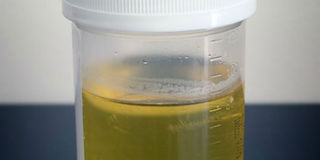Prime
Separating myth from fact on the use of urine as medicine

Though there are many beliefs surrounding the use of urine as medicine, there is no scientific basis to believe that urine consumption is good for your health. Net photo.
How would you react when told to drink your own urine? It is gross and disgusting right? However, many people have tried it for various situations and reasons and there are many claims that it has worked for them.
Violet Mbabazi, a teacher says she has never used urine but has encountered people who consume urine.
“For instance, when a person is very drunk and you want to sober them up, a cup of urine is sometimes prescribed. There is also the belief that when someone has been poisoned or bitten by a snake, they should be given urine,” she reveals.
Medical facts on urine
However, according to Denis Muyaka, a medical officer with Global health Uganda and Mulago hospital, urine is only used in cases of diagnosis for sick people.
Muyaka discourages people from using and even drinking their own urine because it is considered a waste product from the body. “We use it to diagnose patients but we consider it a waste product,” he says.
It is common practice in the local community that once one’s fingers have been burnt, the victim makes a quick visit to the toilet and urinates on the burnt part. However, experts have a contrary view.
“When you get burnt, the most important thing is to stop the burning process and the safest and easiest
way is to use cold water.
This is because it is not infected. Urine only worsens the state of wound and potentially damages the skin, as such contaminating the wound and harming the patient. If there are safer processes to cure wounds and burns,
it is burn care and cold water,” explains Robert Ssentogo, a senior consultant and plastic surgeon with Ministry of Health at Mulago hospital.
Dr Ssentogo has encountered situations where patients turn up with rotten wounds in cases where they have used urine in vain. He recommends using water on burns because it is safe and readily available.
While in secondary school, students are always under peer influence to get their ears pierced, among other practices.
Rebecca Katutu, a final year student at Uganda Christian University, Mukono recalls using urine while in secondary school to treat her pricked ears. “I had just pierced my ears and fearing that I would develop keloids (swellings), I used urine on a daily basis until my pricked ears healed completely,” Katutu recalls.
At some point, she confesses to having used it because of the peer pressure since other students were doing it too. “I never found out why, but it’s a belief I had,” she adds.
No scientific proof
Robert Tinkei, a doctor at Mulago Hospital admits that he has encountered cases of patients using urine for various reasons. “There is no scientific basis that I have come across as a doctor and there is no standardised dosage on taking urine as it is with normal medication,” he asserts.
Doctors have not mentioned any side effects because they disapprove and do not support people who take their own or another person’s urine.
However, some of the side effects of using one’s urine include headache, fatigue, nausea because of the odour of the urine, diarrhoea to mention but a few. And For anyone considering using urine for medicinal purposes, it is safe to consult a doctor to avoid any regrettable aftermath.
All about the history and practice of drinking one’s own urine
Urophagia is the consumption of urine, which is the liquid byproduct of blood filtration in the body. There are various reasons that humans may consume urine.
Urine was used in several ancient cultures for various health, healing, and cosmetic purposes, practices which are still used by some people of these cultures today.
In Euro-American culture, these practices are known as urine therapy, a form of alternative medicine.
Other reasons for urophagia include attempting survival, if no other potable (safe to drink) fluid is available, though numerous credible sources advise against it.
Also, some people consume urine as a sexual activity, and members of at least one culture consume urine for ceremonial purposes.
What is in urine?
Urine is composed of about 95 per cent water and five per cent nitrogenous waste from protein breakdown. Nitrogen from protein degradation forms ammonia, a compound so toxic that only a tiny bit can be tolerated.
Thus our livers quickly convert any ammonia in our bloodstream to urea, which in turn is removed by the kidneys and concentrated in our urine. Urea makes up only two per cent of our urine, and the nitrogen it contains can be used to fertilise plants.
Industrial urea is produced by the millions of tons, but if sources become scarce one day, your urine will literally be worth gold.
Why is urine yellow?
In the Middle Ages, some European alchemists thought urine was yellow because it contained gold. This
led to fruitless efforts to extract the precious mineral.
The yellow colour in urine is actually the same yellow you see on bruises, and what also makes your faecal matter brown.
Bilirubin is a product of old red blood cells that is partly broken down in the liver and stored in the gall bladder.
Most of it is released into our intestines and broken down further, causing faeces to have the yellow hue. Some bilirubin remains in the bloodstream and is converted to urobilin by the kidneys, and this is what gives urine its colour.
Is urine poisonous?
In a nutshell, no, urine is not poisonous. However, just because something is not toxic does not mean it is good for you. Toenail clippings aren’t toxic either, but no one wants them in their food.
Bacteria that line the urethra can contaminate urine and pose a health risk, which is why doctors and urine therapy practitioners use mid-stream urine.
The first few seconds of urination flushes out the bacteria. Urine can also contain harmful substances in those who have taken medication or drugs.
Salts and minerals in urine may pose a hazard as well, especially if the urine is from someone who is dehydrated.
Your kidneys know what they are doing. You can trust them to eliminate stuff your body does not need or cannot store, and retain what is useful and necessary. Drinking pee is like telling your kidneys that they need to double-check their work. No medical evidence supports urine as an effective treatment for any illness.
Information from online sources.




